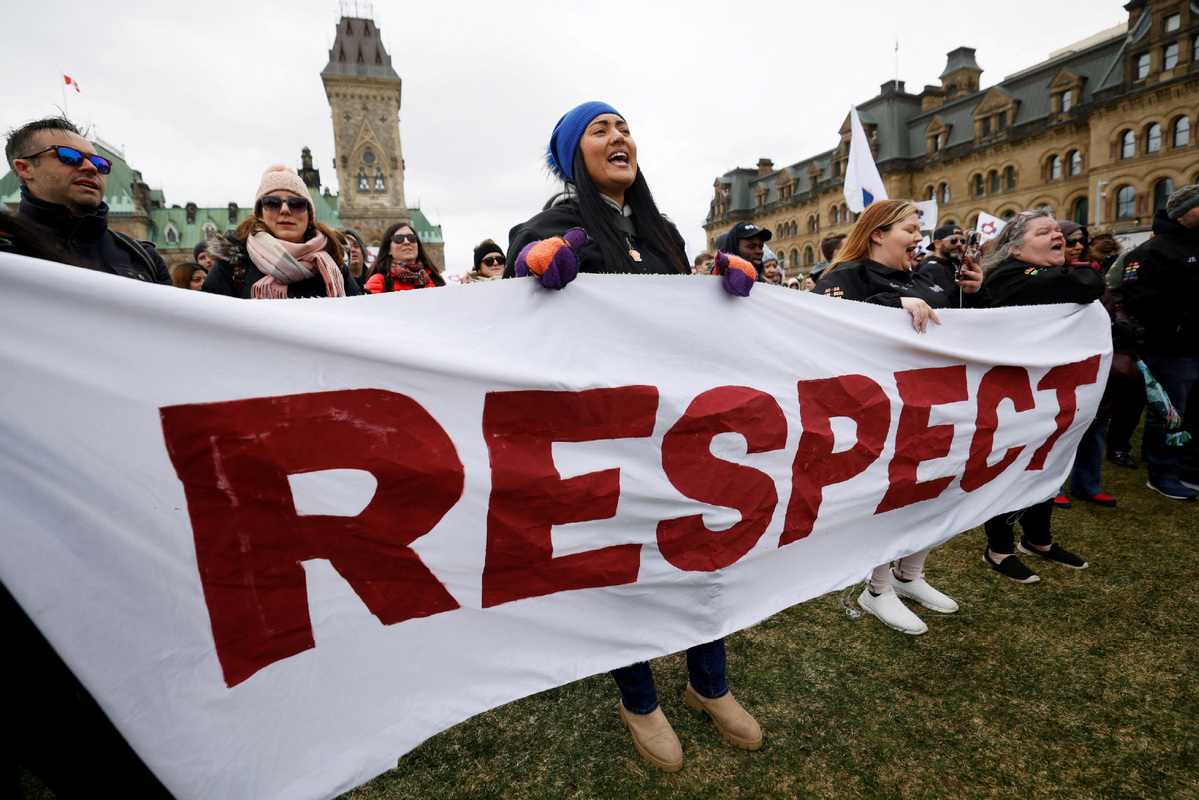Canadian federal public servants go on strike
By RENA LI in Toronto | China Daily Global | Updated: 2023-04-20 11:14

Tens of thousands of federal public servants went on strike after the federal government and the Public Service Alliance of Canada (PSAC) failed to reach a deal before a Tuesday evening deadline.
The union, which represents 155,000 public servants in Canada, says it is striking for fair wages, a better work-life balance, more workplace inclusiveness and reduced layoffs through the creation of more jobs, rather than contracting positions to private organizations.
"We are still a ways apart, but we're staying at the table because we're still hopeful and our goal is still to get to a tentative agreement," Chris Aylward, national president of the PSAC, said to the media late Tuesday while announcing that the strike would begin at 12:01 am ET Wednesday.
"Our members are prepared to fight for a good, decent, fair collective agreement."
The PSAC said picket lines would be set up at more than 250 locations across the country Wednesday morning, and eight were planned across Ottawa-Gatineau, where the federal government is the biggest employer.
The Treasury Board of Canada Secretariat said it has "done everything it can" to reach a deal with its workers. "The government has presented a fair, competitive offer to the PSAC and responded to all their demands," it said in a news release Tuesday night.
"Even though there is a competitive deal on the table, the PSAC continues to insist on demands that are unaffordable and would severely impact the government's ability to deliver services to Canadians," said the release.
Among the 155,000 federal public servants represented by the PSAC with a strike mandate, about 47,000 are considered essential and, although in a legal strike position, will continue to report to work.
During the labour disruption, certain services including Immigration, Refugees and Citizenship Canada, agricultural programs, and veteran support applications may be delayed or not delivered at all.
The public also may have difficulty accessing some Government of Canada buildings where services are delivered.
In a Wednesday morning news release, the Canada Revenue Agency (CRA) said that while there are "no plans to extend tax filing deadlines", the CRA will continue to accept all tax returns.
It said it also has made a "fair, competitive" offer. The CRA will prioritize benefit payments and repeated that the Canada child benefit will not be affected.
Chris Foucault, president of the Union of Taxation Employees in Sudbury, representing some 3,000 CRA workers, told CBC News that he was "shocked" there was not an agreement reached on Tuesday.
One of the big issues for his members is that their salaries have not kept up with the "skyrocketing" cost of living, which essentially means a "pay decrease", he said.
The PSAC union is seeking a 4.5 percent annual wage increase over three years, saying Ottawa's proposed 2.07 percent yearly wage hike was too low.
Another key issue is ensuring that PSAC members may continue to work remotely. The union says that over the course of the COVID-19 pandemic, public service workers proved to be as effective working remotely as when they were in the office, and that 90 percent of workers want to continue working remotely.
"Because we all had to upend our lives when the pandemic hit," Foucault told the media. "We were forced to work from home. Now that people have made these accommodations, they've got rid of their day care; they home-school their children; and now they're being forced to come back to the office."
The government, however, says the demands as currently drafted will severely impact the ability to deliver services to Canadians and would limit its ability to effectively manage employees within the public service.
Prime Minister Justin Trudeau said it was important that negotiations continue. Speaking in Winnipeg on April 13, he said the cost of living is "a real challenge" because of inflation.
In January, talks between Ottawa and PSAC over a new collective agreement broke down, with the union accusing the Treasury Board of Canada not meeting its demands for annual wage increases in line with inflation.
The government said both sides had been in talks to reach an agreement and avoid the strike on Monday. At the time, the government tabled a wage increase offer of 9 percent over three years that mirrors the recommendations of the third-party Public Interest Commission.
In the forthcoming budget bill, the government plans to introduce amendments to the Labour Code, backed by the New Democratic Party, to ban the employment of replacement workers during a strike in federally regulated sectors including the public service, according to The Globe and Mail.
























